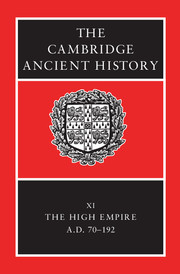Book contents
- Frontmatter
- PART I NARRATIVE
- PART II GOVERNMENT AND CIVIL ADMINISTRATION
- PART III THE EMPIRE
- 8 Frontiers
- 9 The army
- 10 Local and provincial institutions and government
- 11 Rebels and outsiders
- PART IV ROME, ITALY AND THE PROVINCES
- PART Va ECONOMY AND SOCIETY
- PART Vb ART AND CULTURE
- Chronological Table
- BIBLIOGRAPHY
- Index
- 1 The Roman world in the time of Marcus Aurelius
- 7 The Danube provinces
- References
8 - Frontiers
from PART III - THE EMPIRE
Published online by Cambridge University Press: 28 March 2008
- Frontmatter
- PART I NARRATIVE
- PART II GOVERNMENT AND CIVIL ADMINISTRATION
- PART III THE EMPIRE
- 8 Frontiers
- 9 The army
- 10 Local and provincial institutions and government
- 11 Rebels and outsiders
- PART IV ROME, ITALY AND THE PROVINCES
- PART Va ECONOMY AND SOCIETY
- PART Vb ART AND CULTURE
- Chronological Table
- BIBLIOGRAPHY
- Index
- 1 The Roman world in the time of Marcus Aurelius
- 7 The Danube provinces
- References
Summary
ANCIENT AND MODERN CONCEPTS OF SPACE AND FRONTIERS
Our preconceptions about frontiers have been shaped by our own history. Not only must we recognize this fact but also appreciate that a different historical experience determined Roman perception of space. British and French imperialism in the nineteenth century brought to these two superpowers control over vast areas of the world. By the end of the century Britain was responsible for 34,000 kilometres of frontiers and the French had determined over 17 per cent of the borders of contemporary states. Yet there was no sophisticated study of frontiers. What existed was the collective empirical wisdom of soldiers and imperial administrators.
For the British these experiences came from places such as the northwest frontier of India where the term ‘scientific frontier’ was first coined to describe a line which supposedly maximized military, political and natural advantages but which in reality proved completely elusive. Frontiers were always dividing lines between civilized and barbarian worlds, linear barriers ‘to hold back the flood of barbarian inroads’, and it has been in this light that Roman frontiers have often been conceived.
The French were influenced by a different tradition, derived from their own geopolitical predicament of a continental nation whose history has been dominated, from the fourteenth century and from the rise of the absolutist state, by a search for natural boundaries. The great rivers and mountain chains which bounded the French on all sides seemed to provide such lines, irrespective of their military viability, which they then proceeded to apply to their own empire in North Africa and elsewhere.
Keywords
- Type
- Chapter
- Information
- The Cambridge Ancient History , pp. 293 - 319Publisher: Cambridge University PressPrint publication year: 2000
References
- 6
- Cited by

